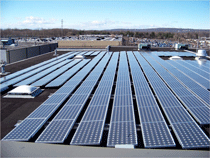Solar power keeps prospects bright at Echo Molding
When it added a 230-kW solar array to the roof of its 35,000-ft2 facility one year ago this month, Echo Molding's management hoped to reduce their company's electricity bill. Turns out, they reached that goal, made some money, and soon saw that customers were won over by the processor's sunny side, too.
April 26, 2010
When it added a 230-kW solar array to the roof of its 35,000-ft2 facility one year ago this month, Echo Molding's management hoped to reduce their company's electricity bill. Turns out, they reached that goal, made some money, and soon saw that customers were won over by the processor's sunny side, too.
|
Echo Plastics' solar array in Union, NJ. |
The injection molder runs a facility in Union, NJ with 20 molding machines with clamp forces ranging from 90 up to 700 tonnes; 18 of the presses are from Nissei. The company molds a wide variety of applications including spools, display cases, and close-tolerance electronic parts, for short or long production runs.
According to Echo, its solar power installation has reduced its electric bill by more than $38,000 in this first year and earned the company $150,000 in revenue through the sale of Solar Renewable Energy Certificates (SRECs) generated by its system. "Energy savings from our solar system has helped us compete in the global market. Anything we can do to reduce costs will help us keep manufacturing and jobs in the USA," said Armin Schlotterbeck, Molding Manager of Echo Molding.
SRECs are given to companies that can prove that one megawatt-hour (MWh) of electricity was generated from renewable energy. The energy is fed into the local electrical grid, and the supplier—in this case Echo Molding—is paid for the electricity it generates. Echo's location serves it well as the reimbursement for SERCs varies but generally is highest in the U.S. in the Mid-Atlantic states.
Lowering its electric bill was good news, but the processor also reaped other benefits. "Adding solar power to our facility has helped generate sales from clients who are looking for vendors that are environmentally conscious," said Carl Foehner, the company's director of sales and marketing. "We have some clients adding 'manufactured in a solar-powered facility' to their product packaging."
Echo had GeoGenix (Rumson, NJ) design and handle the installation of the solar array, as well as take care of the permits, rebates, and other documentation required throughout the installation. —Matt Defosse
About the Author(s)
You May Also Like



